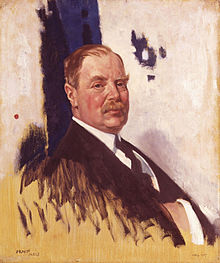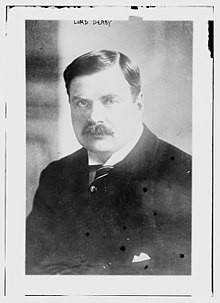Edward Stanley, 17th Earl of Derby

Edward George Villiers Stanley, 17th Earl of Derby KG , GCB , GCVO , TD , KStJ , PC , JP (born April 4, 1865 in Westminster , London , † February 4, 1948 in Knowsley , Lancashire ) was a British nobleman, officer and conservative politician. He was twice British Minister of War and ambassador to France .
Life
Origin and education
Stanley was born at 23 St. James's Square , Westminster, to the eldest son of Frederick Stanley , later 16th Earl of Derby , and his wife, Lady Constance Villiers. His paternal grandfather was three-time Prime Minister Edward Smith-Stanley, 14th Earl of Derby , and his maternal grandfather was Liberal statesman George Villiers, 4th Earl of Clarendon . He was educated at Wellington College , Berkshire.
Military career and entry into politics
Stanley received a lieutenant's license in a militia regiment, the King's Own (Royal Lancaster Regiment) in 1882, and three years later moved to the Grenadier Guards , to which he belonged for ten years until 1895. He was posted from 1889 to 1891 to serve as his father's aide-de-camp , then Governor General of Canada . In 1892 he was elected to the House of Commons for the constituency of Westhoughton and again detached from his regiment to represent his seat. From 1895 to 1900 he served as Lord of the Treasury
In 1899 he became a reserve officer and colonel of honor in the 2nd Volunteer Battalion, Loyal North Lancashire Regiment . During the Second Boer War, he initially served as press censor in Cape Town and accompanied Lord Roberts' headquarters in the same function on his campaign against the Boer republics . From July 1900 he acted as Roberts' private secretary and was accepted as a companion in the Bath Order and mentioned twice in dispatches . From 1900 to 1903 he was Treasury Secretary in the War Office and then succeeded Austen Chamberlains as Postmaster General in the Balfour government in October of the latter year . As such, he was sworn into the Privy Council . In December 1905, the government was overthrown, and in the subsequent 1906 election, Stanley lost his seat in parliament to Labor politician William Wilson. Two years later his father died and he followed him in peerage and took his place in the House of Lords . In 1909 he was chancellor of the University of Liverpool and in 1911 Mayor ( Lord Mayor ) Liverpool .
Politician in World War I and in the interwar period
At the beginning of the First World War , Lord Derby led a successful recruitment campaign for Kitchener's army in Liverpool in August 1914 , where four pals battalions were set up within a few weeks . From October 1915 to 1916 Derby acted as Director-General of Recruiting and, within a few days, drafted a plan ( Derby Scheme ) that would force all men between 18 and 41 who were not in important jobs to publicly declare whether they would serve in the war wanted to. This was one of the steps towards the introduction of conscription for unmarried men in early 1916. In July 1916 Derby was appointed Under-Secretary of State for War in the Asquith coalition government and succeeded him as Minister of War after David Lloyd George took over the post of Prime Minister in December 1916. In this capacity he was a supporter of the Westerners in the British military leadership around the Chief of the Imperial General Staff William Robertson and the Commander-in-Chief on the Western Front Douglas Haig . Over time, however, both men showed increasingly less respect for their civilian superior. In April 1918, after the German offensives on the Somme and in Flanders, he had to surrender his post to Lord Milner .
Derby was instead appointed ambassador to France as the successor to the elderly Lord Bertie , which he would remain until November 1920. In his term, which was successful against all expectations, which fell Paris Peace Conference of 1919. In April 1921 Derby on a secret negotiating mission to Éamon de Valera sent to Ireland and it seems plausible that this the end of the ceasefire in the Irish War of Independence of 11 July, which ultimately led to the Anglo-Irish Treaty .
After the end of the Lloyd George government in 1922, Derby was again Minister of War in the subsequent Bonar Law government , which he remained until the end of the government in May 1923.
Other functions and activities
In 1917 Lord Derby was the founder of the organization " Comrades of the Great War ". He was also honorary president of the Rugby Football League . The French trophy Lord Derby , played since 1934, is named after him. He was also from 1929 to 1945 chairman of the Pilgrims Society , which is committed to maintaining relations between Great Britain and the United States. From 1928 until his death he was Lord Lieutenant of Lancashire . Derby was a Freemason and Grand Master of the Provincial Grand Lodge of East Lancashire from 1899 until his death .
Lord Derby also continued the family tradition of horse breeding and was one of the most successful stable owners of the first half of the 20th century with three wins at the Epsom Derby between 1924 and 1942 and numerous other successes. In 1930 he appeared on the front page of Time while he was in the United States for the Kentucky Derby . His thoroughbred stallion Phalaris appears in the paternal line of numerous great champions.
Family and offspring
In 1889 Stanley married Alice Maud Olivia Montagu, daughter of William Montagu, 7th Duke of Manchester and Luise von Alten . He had three children with her:
- Lady Victoria Alice Louise Stanley (1892–1927), ⚭ 1915 Neil Primrose (⚔ 1917), son of Archibald Primrose, 5th Earl of Rosebery , ⚭ (2) 1919 Sir Harold Bullock, 1st Baronet;
- Edward Montagu Cavendish Stanley, Lord Stanley (1894-1938);
- Oliver Frederick George Stanley (1896-1950).
Since Stanley survived his older son Edwards, his son Edward John inherited his title of nobility as 18th Earl when Stanley died in 1948.
Movie
In the 1981 miniseries Winston Churchill: The Wilderness Years, first aired on ITV , Lord Derby was played by actor Frank Middlemass .
literature
- David Dutton (Ed.): Paris 1918: The War Diary of the British Ambassador, the 17th Earl of Derby. Liverpool University Press, 2001.
Web links
- Edward Stanley, 17th Earl of Derby at the Hansard (English)
- Edward Stanley, 17th Earl of Derby on thepeerage.com
Footnotes
- ↑ Phalaris' profile on tbheritage.com .
| predecessor | Office | successor |
|---|---|---|
| Austen Chamberlain | Postmaster General 1903–1905 |
Sydney Buxton |
|
David Lloyd George Laming Worthington-Evans |
Secretary of State for War 1916-1918 1922-1923 |
Lord Milner Stephen Walsh |
| Francis Bertie, 1st Viscount Bertie of Thame |
British Ambassador to Paris 1918–1920 |
Charles Hardinge, 1st Baron Hardinge of Penshurst |
| Frederick Arthur Stanley |
Earl of Derby 1908-1948 |
Edward John Stanley |
| personal data | |
|---|---|
| SURNAME | Stanley, Edward, 17th Earl of Derby |
| ALTERNATIVE NAMES | Stanley, Edward George Villiers, 17th Earl of Derby |
| BRIEF DESCRIPTION | British nobleman, officer and Conservative politician |
| DATE OF BIRTH | April 4, 1865 |
| PLACE OF BIRTH | Westminster , London |
| DATE OF DEATH | February 4, 1948 |
| Place of death | Knowsley , Lancashire |
